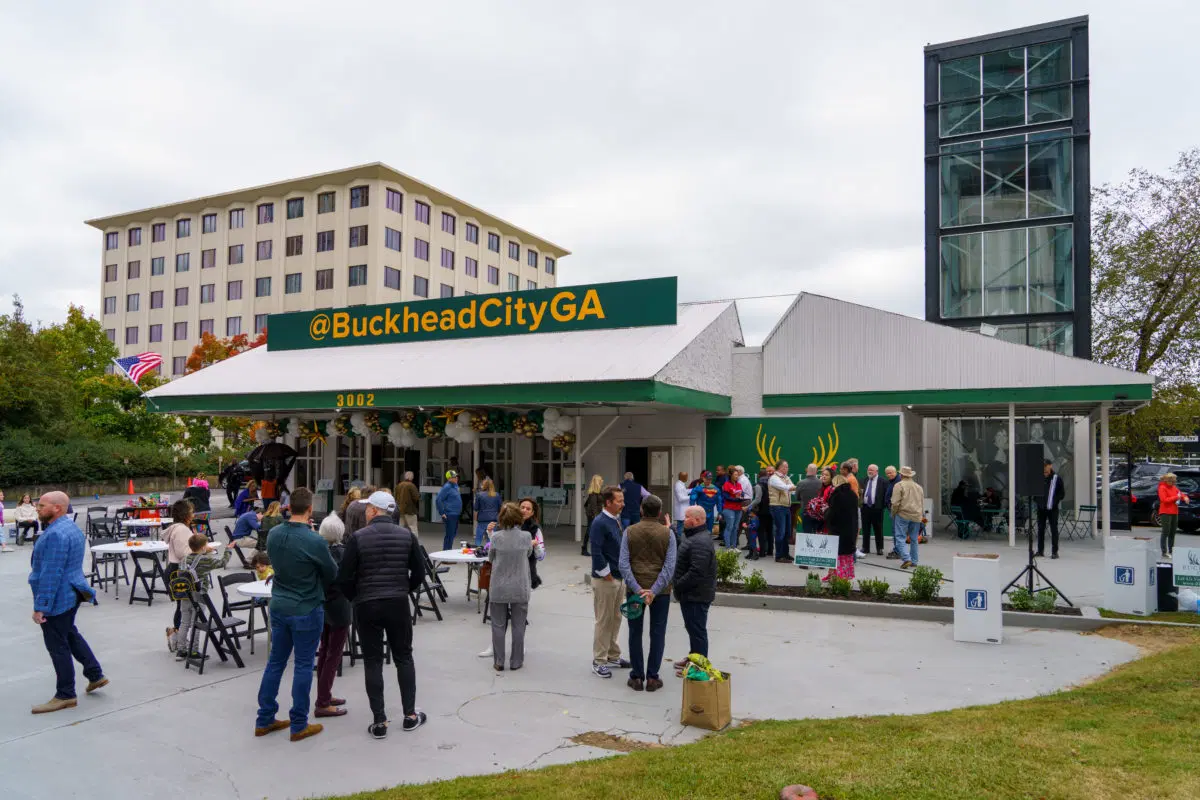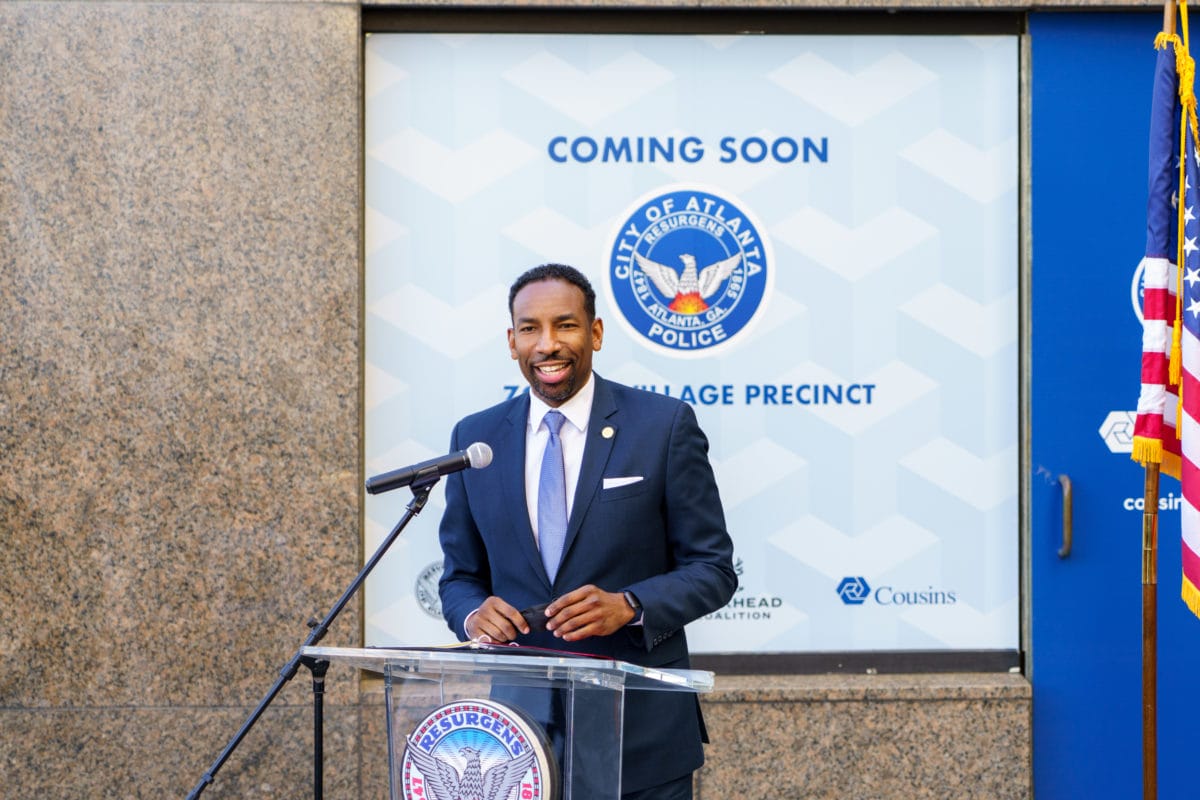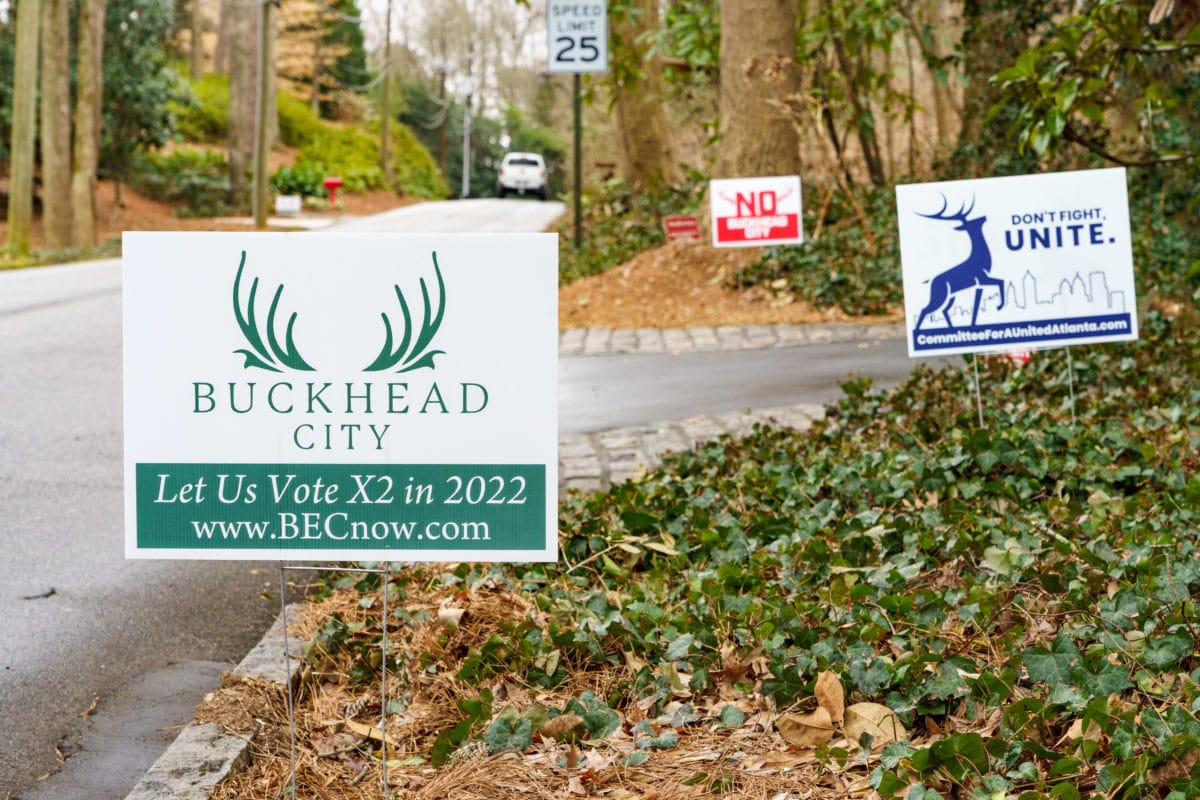The State Senate voted down March 2 a bill that proposed “The City of Buckhead City” and a referendum allowing residents of the community to vote on creating the municipality, effectively killing the cityhood movement for now. The vote is the most recent occurrence in the Buckhead City saga that started modestly in 2020 but quickly picked up steam as a notably polarizing issue among residents and business owners. It also sets up what could be a consequential battle for future cityhood efforts statewide.

Attempts to create a Buckhead municipality aren’t without precedence as a group of disgruntled residents first floated the idea in 2008, and cityhood was brought back into discussion in 2016 during former Mayor Kasim Reed’s last term in office, which was riddled with corruption. Those rumblings continued into 2017 after Keisha Lance Bottoms narrowly defeated Buckhead resident Mary Norwood in the Atlanta mayoral race. Simultaneously, a referendum for the Eagle’s Landing community to secede from Stockbridge failed but illustrated a path for Buckhead residents to potentially cast their own vote on cityhood.
Amid a backdrop of increasing crime and some residents’ continued frustrations over city services, the idea of creating a Buckhead municipality gained momentum in 2020. The politics surrounding the issue quickly became partisan and led to the creation of two organizations — the Buckhead City Council lobbying in favor of cityhood and the Committee for A United Atlanta opposed to the municipality.
With the State Senate voting down the bill on the municipality March 2, the Buckhead City movement appears to have been put on pause for now, providing a respite for both supporters and detractors of cityhood after nearly three years of significant battles. The following are key moments in the cityhood movement leading to the bill’s failure and where the Buckhead City effort stands for the future.
July 2020
First Rumblings and First Opposition
Rumors of semi-organized talk flew until finally came the emergence of the Buckhead Exploratory Committee — now known as the Buckhead City Committee — in semi-public virtual meetings. Members, who would not identify themselves, talked about a variety of options: cityhood, annexation into another city, or just sending a complaint to the mayor. They also discussed the racial implications of a majority-white neighborhood leaving Atlanta, which became a major issue of the debate, and said racists would not be welcome in the movement. Opposition quickly emerged from Bottoms, former Mayor Sam Massell, and four major local organizations: the Buckhead Community Improvement District, the Buckhead Coalition, the Buckhead Business Association and Livable Buckhead.
January-February 2021
The BCC Goes Public
The BCC went public in a January meeting that made cityhood the focus and sought money for polling. By February it finally identified its leaders and hired lobbyists to work the legislature.
March 2021
Legislation Round One
State Sen. Brandon Beach (R-Alpharetta) and state Rep. Todd Jones (R-South Forsyth) squeeze cityhood bills into the end of the legislative session. As rough-draft forms, the move largely served as political publicity.
May 2021
First Forum, First Opposition Group
The first cityhood forum was held at a virtual meeting of the Buckhead Council of Neighborhoods, with White on the supporter side and Linda Klein, a Buckhead Coalition member, on the opposition side. A week later, the opposition group Committee for a United Atlanta emerged with Klein as its co-chair alongside Edward Lindsey, a former state rep. for Buckhead.
August 2021
Early Polling
A BCC poll found majority support for holding a vote on the cityhood question, though it did not ask about a position on cityhood itself. The poll also revealed a deep partisan divide on the question, with local Republicans overwhelming in support and a plurality of Democrats opposed. Subsequent polls by the BCC and CUA found a continuing partisan divide, and by January 2022, the CUA reported opposition was rising and was maybe the majority position.
September 2021
Dueling Studies
The BCC released a feasbility study showing Buckhead City would work in sheer revenue-and-expenditure terms. The study was a legally required step for cityhood legislation to continue moving ahead. The CUA quickly followed with a counter-study saying cityhood would blow huge holes in the City of Atlanta and Atlanta Public Schools budgets, opening other unanswered questions about bond debt and whether APS could operate legally in another city.
October-November 2021
Political Campaigns Begin
Atlanta’s state Senate and House delegations — including all Buckhead legislators — announce they will fight cityhood bills. On Halloween, the BCC opens a campaign headquarters on Peachtree Road, which the City later cited for alleged sign violations, triggering a First Amendment lawsuit from the group. In November, Sen. Beach again pre-files a cityhood bill.
November-December 2021
Opposition Grows
Cityhood opposition grows, with North Atlanta Parents for Public Schools saying it will back the Atlanta Board of Education’s fight against the idea, and the formation of a new grassroots group called Neighbors for a United Atlanta.
November 2021
New Mayor Elected
Andre Dickens is elected as the new mayor in a late-November runoff against Felicia Moore, the more locally favored contender. However, both candidates opposed cityhood and the BCC denounced both. Dickens quickly takes a hands-on approach to countering cityhood, attending local meetings, joining opposition group events, and touting a yet-to-open police mini-precinct in Buckhead.

December 2021-January 2022
White’s social media controversies
BCC leader White was already controversial for some insulting and incorrect public commentary, and his past involvement in fundraising scandals. But he triggered widespread public outrage over racial remarks. First he called Dickens a racist, then followed up by retweeting comments from the white nationalist affiliated website VDARE attributing crime to Black populations. White apologized for the latter post, but in February again drew outrage in social media comments that spun a debate about funding for a MARTA project into a conspiracy theory that its CEO’s recent suicide was due to a non-existent theft of money.
December 2021-January 2022
Political Chess Games Begin
While White made incendiary comments, cityhood opponents began a political chess game. The City Council passed bond refinancing that included a “poison pill” putting a new Buckhead City on the hook for a huge payment. Lt. Gov. Duncan assigned the Senate version of cityhood legislation to all-Democrat committee, giving it bleak prospects. And Buckhead’s lawmakers plotted legislation requiring a cityhood referendum to be held citywide, not just in the neighborhood, and require a supermajority to win.
February 2022
The Cityhood Movement Gets Shot Down
The push to create a Buckhead municipality was effectively quelled with then Lt. Gov. Geoff Duncan and the late House Speaker David Ralston announcing they would not allow cityhood legislation to proceed for the 2022 state legislative session. The move from some of the state’s top GOP officials resulted in the state Senate not taking up the bill, and with passage required for both chambers to include the cityhood referendum on the 2022 ballot, the cityhood movement was not introduced in the State House.
Both Ralston and Duncan announced they would not take up the issue under the Gold Dome to allow then newly elected Atlanta Mayor Andre Dickens an opportunity to reduce violent crime.
In response, the BCC said it would continue its fight with White remaining in his role leading the organization. The committee also said it would continue fundraising and urged its members and supporters to keep up the cause.
June 2022
Dickens Notes A Reduction In Crime
A new APD precinct began operating in Buckhead on West Paces Ferry Road in a move to help combat crime in the area. Dickens used the opportunity to note that personal and property crime were down 12 percent year-over-year. However, cityhood supporters remained un-swayed.
September 2022
Political squabbling continues
The Buckhead cityhood movement was briefly again at the forefront of political infighting after Atlanta City Council member Mary Norwood took Atlanta to task for “neglecting” Buckhead. In an op-ed published by Insider Advantage, Norwood wrote the issues concerning cityhood go beyond crime.
“It boils down to many years of Buckhead’s neglect by the city of Atlanta’s government,” Norwood wrote. She cited issues of unfulfilled requests for capital plans from the city’s government, misuse of TSPLOST funds, neglected roads, the denial of a study on potential traffic mitigation solutions, clearcutting from unchecked development and zoning complaints.
Dickens’ administration countered by stating many of Norwood’s concerns are being addressed and took issue with Norwood’s article missing “context or accuracy.”
February 2023
Buckhead City Movement Passes A Major Milestone
The creation of the “City of Buckhead City” fight was fully renewed with two separate State Senate bills introduced calling for Buckhead residents to vote on de-annexation and the creation of the municipality on the 2024 ballot. Like previously proposed legislation, both bills were sponsored by lawmakers outside of the Buckhead area.
The bills outlined some key aspects of how Buckhead City would operate, including the creation of a city council with six districts. Other stipulations included sky-high payments to the proposed city’s mayor — $225,000 per year for the first four years in office. Under the proposals, the City of Atlanta would also be required to sell the new city assets at bargain prices, including $100-per-acre for parkland, $5,000 for existing fire stations and $100,000 each for the water and sewer systems under the city’s proposed borders.
The bills passed a major hurdle as they were approved by the Senate State and Local Governments Operations Committee, which voted 4-3 along party lines, with Republicans in favor, to advance the proposals. The votes marked the first time in which a Buckhead cityhood bill had advanced out of committee.
During hearings on the bills, the BCC continued to argue that those in Buckhead should be given the opportunity to vote on cityhood, while those opposed presented a litany of potential issues the bills would create.
Those concerns were brought to a head by a Feb. 28 memo from Gov. Brian Kemp’s administration outlining 11 key issues with the bills, stating they “demand evaluation for the unique constitutional and statutory challenges” they present. The memo directed lawmakers to address the issues before considering the bills. No such actions were taken publicly.
March 2023
Buckhead City Proposals Fail
The incorporation of Buckhead City was killed for the 2023 legislative session on March 2 with SB 114 failing on the Senate floor. The measure was voted down 33-23 with all Democrats in opposition and 10 Republican representatives crossing the aisle to cast “nay” votes. On the same day, SB 113, another bill calling for Buckhead cityhood, was tabled by the chamber.
The Committee for A United Atlanta released a statement thanking supporters for their “major role” in the senate voting down the legislation while outlining that “many of the issues that drove this debate remain.” The letter noted the group will continue working with Mayor Dickens, the Atlanta City Council and the community to “keep the focus” on public safety, city services and that Buckhead residents have their voices heard.
Meanwhile, the BCC has seemingly called its quits on the cityhood movement, at least for now.
A BCC email sent to supporters and posted to its Facebook page said “there is no path forward for a cityhood referendum” until Kemp’s current term ends. Kemp’s term ends on January 11, 2027. The BCC’s letter alleged that Kemp’s administration worked “behind closed doors” to kill the bill.
“Although we had hoped for a different outcome this legislative session, we will continue to work for the cityhood referendum in the future,” the letter said.
What’s Next For The Buckhead Cityhood Movement?
With the BCC’s role spearheading the cityhood movement and the group’s announcement they are putting efforts on pause while Kemp is in office, the Buckhead City push appears to be on the backburner for at least several years. If the BCC adheres to its latest announcement, it seems unlikely any lawmakers will take up the cause with its strongest proponents seemingly unwilling to continue the fight until 2027. However, much remains to be seen how Dickens’ administration and the Atlanta City Council will address issues raised by the BCC over the coming years. Additionally, the BCC will still need to field support from lawmakers to sponsor any future cityhood bills, and there is the potential for a complete turnover of local representation over the next several years.





